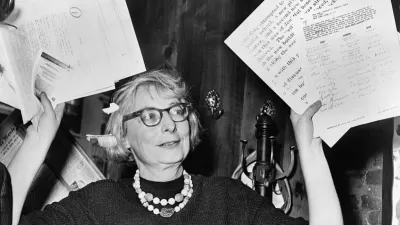Could the Los Angeles River use its own 'power broker'?
With the legacies of Robert Moses and Frederick Law Olmsted recently under discussion, Sam Hall Kaplan joins the conversation—offering a rich overview of Moses' work along with colorful anecdotes from their personal interactions. He then draws on the lessons of these two planning giants to explore major developments around Los Angeles River revitalization.
Kaplan explains, "With a bombastic glee, Moses arbitrarily imposed priorities, bent budgets, denigrated opponents, and expedited contracts. The banks and labor unions loved him. Politicians feared him. And communities hated him. He never learned to drive, preferring to be chauffeured. But if he had a favored vehicle, it was the bulldozer, as anyone standing in his way can attest. Public accountability and transparency were not common pursuits in the Depression and quarter century following, when Moses transformed New York City and state."
Despite this reputation, Kaplan wonders whether the Los Angeles River might need a personality equally able to get things done. He gives readers a sense of the "many public and private interests wading in the 51-mile course of the river," speaking with certain key figures to demonstrate the sheer number of projects and agendas at work. Given the Army Corps of Engineers' recent decision to recommend the $1.08-billion Alternative 20, promising habitat restoration and recreation for 11 miles of the waterway, Los Angeles faces the daunting task of organizing these multi-faceted efforts.
Kaplan concludes with a telling story: "I remember too well a community hearing nearly a decade ago for a particularly ambitious mixed-use school, parks and, housing project edging the river in Cypress Park... No one spoke out for housing, jobs, or a river promenade. This prompted an observer, when leaving, to confront the presumably pro-river councilman and loudly comment, 'Less consensus and more "cojones" would have been welcome.' It was a phrase that would have pleased Robert Moses and his champions."
A planner, writer, and academic, Kaplan has worked as both a design critic for the Los Angeles Times and an urban affairs reporter for the New York Times, along with teaching at Art Center College of Design, Yale, and Princeton. This exclusive article for The Planning Report reflects the writer's own opinions and research.
FULL STORY: Moses and the Future of the LA River

Maui's Vacation Rental Debate Turns Ugly
Verbal attacks, misinformation campaigns and fistfights plague a high-stakes debate to convert thousands of vacation rentals into long-term housing.

Planetizen Federal Action Tracker
A weekly monitor of how Trump’s orders and actions are impacting planners and planning in America.

San Francisco Suspends Traffic Calming Amidst Record Deaths
Citing “a challenging fiscal landscape,” the city will cease the program on the heels of 42 traffic deaths, including 24 pedestrians.

Defunct Pittsburgh Power Plant to Become Residential Tower
A decommissioned steam heat plant will be redeveloped into almost 100 affordable housing units.

Trump Prompts Restructuring of Transportation Research Board in “Unprecedented Overreach”
The TRB has eliminated more than half of its committees including those focused on climate, equity, and cities.

Amtrak Rolls Out New Orleans to Alabama “Mardi Gras” Train
The new service will operate morning and evening departures between Mobile and New Orleans.
Urban Design for Planners 1: Software Tools
This six-course series explores essential urban design concepts using open source software and equips planners with the tools they need to participate fully in the urban design process.
Planning for Universal Design
Learn the tools for implementing Universal Design in planning regulations.
Heyer Gruel & Associates PA
JM Goldson LLC
Custer County Colorado
City of Camden Redevelopment Agency
City of Astoria
Transportation Research & Education Center (TREC) at Portland State University
Jefferson Parish Government
Camden Redevelopment Agency
City of Claremont



























